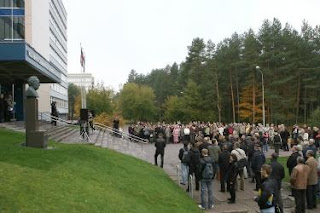
Оксана Бычкова
15 июня подвел итоги XIX Международный фестиваль "Кинотавр". В конкурсной программе участвовала вторая по счету работа молодого режиссера Оксаны Бычковой "Плюс один". И хотя Гран-при фильм не получил, однако жюри отметило англичанина Джетро Скиннера призом за лучшую мужскую роль. В плотной фестивальной программе режиссер Оксана Бычкова нашла время для нашего корреспондента.
Корреспондент. По первому образованию вы журналист, работали на радио. Откуда вдруг появилось желание стать режиссёром?
Оксана Бычкова. Я вот всё время пытаюсь вспомнить эту точку отсчёта и, честно говоря, мне никак не удаётся. Мне кажется, что как-то всё случайно так вышло, что в 2000 году я решила в интернет-поисковике забить «Высшие режиссёрские курсы» и посмотреть, есть ли набор. Оказалось, буквально через месяц заканчивается приём документов, и очень удачно всё сложилось в какой-то момент: у меня есть время, там идёт приём… Было непонятно, поступлю я или нет. В итоге сестре спасибо – она сказала: «Если твоё, то всё сложится». И сложилось. У меня никогда не было такой уверенности, жёсткой линии: вот я стану режиссёром и буду снимать кино. У меня была одноклассница Оля, которая говорила: «Я буду во ВГИК поступать». Мне казалось: какая смелая девочка! То есть, ВГИК и Голливуд – это равнозначные термины. У нас на курсах процентов восемьдесят народу были бывшие журналисты. Журналистское прошлое вообще очень помогает в работе. Когда журналист собирается разговаривать с кем-то, думает, какие вопросы задавать, какой человек к нему придёт. Это всё потом очень помогло в работе с актёрами.
Корреспондент. Вы делаете уже второй фильм с одной и той же командой. Расскажите, с чего началось это сотрудничество и почему оно продолжается.
Оксана Бычкова. Это просто очень удобно – работать с людьми, которых ты уже хорошо знаешь, как близких родственников, и положительные стороны, и недостатки, уже как-то притёрся. У нас с оператором просто настал такой момент, мы стали без слов друг друга понимать, настолько уже слаженные отношения, столько фильмов уже вместо просмотрено. А началось… С Ваней, оператором мы познакомились на какой-то дружеской вечеринке. То есть, все постепенно случайным образом сами собирались, при этом очень удачно. Не было такого, чтобы я выбрала кого-то и хотела целенаправленно именно с ним поработать. Вообще, получается, что моя работа строится на каких-то постоянных случайностях. Я начинаю отслеживать эти моменты, в них какой-то закономерности прямой нет. Единственное, был такой момент: я закончила курсы и работала вторым режиссёром у своего мастера на проекте, а параллельно писала сценарий. Вот тут нет случайности: я понимала, что никто не будет звонить и спрашивать, нет ли у меня сценария, буквально с авоськой обходила продюсеров, приносила им и упорно обзванивала. Это самый действенный метод. Легко говорить, что кино в наше время не снимают и пробиться невозможно. Это такое оправдание. Ходить по людям со сценарием очень сложно. Сложно бомбить их телефонными звонками. Тем не менее, в моём случае это сработало, сценарий заметили, меня очень быстро запустили.
Корреспондент. Ваш первый фильм «Питер-FM» имел практически оглушительный успех. Как вы считаете, в первом успехе для режиссёра больше плюсов или минусов.
Оксана Бычкова. Я думаю, больше минусов. Если человек гениален, возможно, у него уже в первом фильме всё безупречно. На самом деле, первый фильм – это начальная ступень, предстоит ещё такая школа впереди. Если вдруг случается какой-то успех, то от тебя всё время чего-то ждут. Ждут, что ты должен как-то преуспеть во втором фильме, и в третьем. А ты на самом деле ничего никому не должен. И дальше «образуешься» в своей личной киношколе. Вот это ожидание, когда люди сидят в зале и сравнивают, оно, конечно, мешает. Второй проект – это сложнее, чем первый. Я думала, у меня уже есть некий опыт, однако каждый фильм – это что-то настолько новое, что ты будешь всё равно как первый раз что-то переживать. Каждый раз новые проблемы поворачиваются новыми гранями. Не будет такого ощущения: я теперь знаю, как всё преодолеть. Нет. Это просто следующая ступенька.
- Полный текст интервью с Оксаной Бычковой
Корреспондент. По первому образованию вы журналист, работали на радио. Откуда вдруг появилось желание стать режиссёром?
Оксана Бычкова. Я вот всё время пытаюсь вспомнить эту точку отсчёта и, честно говоря, мне никак не удаётся. Мне кажется, что как-то всё случайно так вышло, что в 2000 году я решила в интернет-поисковике забить «Высшие режиссёрские курсы» и посмотреть, есть ли набор. Оказалось, буквально через месяц заканчивается приём документов, и очень удачно всё сложилось в какой-то момент: у меня есть время, там идёт приём… Было непонятно, поступлю я или нет. В итоге сестре спасибо – она сказала: «Если твоё, то всё сложится». И сложилось. У меня никогда не было такой уверенности, жёсткой линии: вот я стану режиссёром и буду снимать кино. У меня была одноклассница Оля, которая говорила: «Я буду во ВГИК поступать». Мне казалось: какая смелая девочка! То есть, ВГИК и Голливуд – это равнозначные термины. У нас на курсах процентов восемьдесят народу были бывшие журналисты. Журналистское прошлое вообще очень помогает в работе. Когда журналист собирается разговаривать с кем-то, думает, какие вопросы задавать, какой человек к нему придёт. Это всё потом очень помогло в работе с актёрами.
Корреспондент. Вы делаете уже второй фильм с одной и той же командой. Расскажите, с чего началось это сотрудничество и почему оно продолжается.
Оксана Бычкова. Это просто очень удобно – работать с людьми, которых ты уже хорошо знаешь, как близких родственников, и положительные стороны, и недостатки, уже как-то притёрся. У нас с оператором просто настал такой момент, мы стали без слов друг друга понимать, настолько уже слаженные отношения, столько фильмов уже вместо просмотрено. А началось… С Ваней, оператором мы познакомились на какой-то дружеской вечеринке. То есть, все постепенно случайным образом сами собирались, при этом очень удачно. Не было такого, чтобы я выбрала кого-то и хотела целенаправленно именно с ним поработать. Вообще, получается, что моя работа строится на каких-то постоянных случайностях. Я начинаю отслеживать эти моменты, в них какой-то закономерности прямой нет. Единственное, был такой момент: я закончила курсы и работала вторым режиссёром у своего мастера на проекте, а параллельно писала сценарий. Вот тут нет случайности: я понимала, что никто не будет звонить и спрашивать, нет ли у меня сценария, буквально с авоськой обходила продюсеров, приносила им и упорно обзванивала. Это самый действенный метод. Легко говорить, что кино в наше время не снимают и пробиться невозможно. Это такое оправдание. Ходить по людям со сценарием очень сложно. Сложно бомбить их телефонными звонками. Тем не менее, в моём случае это сработало, сценарий заметили, меня очень быстро запустили.
Корреспондент. Ваш первый фильм «Питер-FM» имел практически оглушительный успех. Как вы считаете, в первом успехе для режиссёра больше плюсов или минусов.
Оксана Бычкова. Я думаю, больше минусов. Если человек гениален, возможно, у него уже в первом фильме всё безупречно. На самом деле, первый фильм – это начальная ступень, предстоит ещё такая школа впереди. Если вдруг случается какой-то успех, то от тебя всё время чего-то ждут. Ждут, что ты должен как-то преуспеть во втором фильме, и в третьем. А ты на самом деле ничего никому не должен. И дальше «образуешься» в своей личной киношколе. Вот это ожидание, когда люди сидят в зале и сравнивают, оно, конечно, мешает. Второй проект – это сложнее, чем первый. Я думала, у меня уже есть некий опыт, однако каждый фильм – это что-то настолько новое, что ты будешь всё равно как первый раз что-то переживать. Каждый раз новые проблемы поворачиваются новыми гранями. Не будет такого ощущения: я теперь знаю, как всё преодолеть. Нет. Это просто следующая ступенька.
- Полный текст интервью с Оксаной Бычковой












